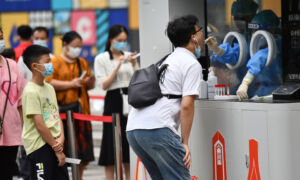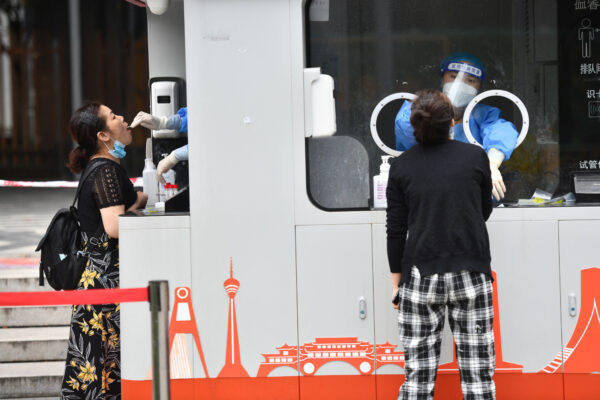China Locks Down 21 Million in the Metropolis of Chengdu
The Chinese regime placed 21 million in the southern megacity of Chengdu under lockdown, the largest move to contain the COVID-19 flareups since Shanghai’s shutdown.All residents must stay at home starting at 6 p.m. on Sept. 1, the city official said in a statement. Families are permitted to send one person—who has a negative result on a PCR test taken within 24 hours—per day to get groceries. There is no word on when the lockdown will be lifted. Chengdu, the provincial capital of Sichuan Province, is the biggest city to be shut down since the financial hub Shanghai emerged from the two-month lockdown earlier this year. The sweeping move came as Chinese Communist Party (CCP) officials across the country stepped up restrictions to contain COVID-19 outbreaks in the run-up to the Party’s October conclave—considered to be a politically sensitive time. Chinese leader Xi Jinping is expected to secure an unprecedented third five-year term in office during the CCP’s 20th Congress set to begin on Oct. 16. Millions in other Chinese cities, from the southern city of Shenzhen to Dalian in the northeast, have embraced lockdown this week. The Chinese regime holds tight to its zero-COVID policy, which aims to eliminate every infection among communities through digital surveillance, repeated testing, strict quarantine, and lockdown, despite the social and economic tolls. On Thursday, Volvo Cars announced it would temporarily close its Chengdu factory, according to Reuters. The southwest city, along with other regions in Sichuan, has already struggled with a record-breaking drought and extremely hot weather, which has dwindled the region’s hydropower output and led to power cuts in households and factories. People walking down from an escalator as one side of it is stopped to save energy at a shopping mall in Chengdu, in China’s southwestern Sichuan province on Aug. 17, 2022. (STR/AFP via Getty Images) Detailed Requirement Thursday’s lockdown came after Chengdu registered 157 cases in the past 24 hours, pushing the total infections to more than 900 cases since Aug. 12. The official count, however, has been disputed by residents and experts, who point to the Chinese regime’s history of downplaying and covering up information about outbreaks across the country. Chengdu has also delayed the start of the new school term. The authorities ordered everyone to receive multiple tests starting from Thursday. All shops have been shut down except for essential services like supermarkets and pharmacies. Under the latest curbs, residents are not allowed to leave the city without special permission, though public transport continues to operate. About 70 percent of the flights have been suspended to and from Chengdu, which is an economic center and a major transit hub in Sichuan. Health workers take swab samples from residents to be tested for the COVID-19 coronavirus in Chengdu, in China’s southwestern Sichuan province on Sept. 1, 2022. (-/AFP via Getty Images) Despite officials’ assurances that supplies were plentiful, the news sparked panic buying on Thursday. A resident in Qingyang District told The Epoch Times that nearby supermarkets ran out of leafy vegetables on Thursday evening. ‘Rumor’ On the microblogging platform Weibo, many mocked the authorities for arresting a social media user who raised the alarm about the lockdown earlier this week. On Aug. 29, a Chinese netizen, under the name “Tropical Forest,” said the provincial authorities were planning for a city-wide lockdown on Wechat, an instant messaging app. The message quickly went viral on the country’s social media late Monday, resulting in shoppers thronging stores and online platforms, snapping up leafy vegetables, meat, and other daily necessities. On Aug. 30, Chengdu police announced the resident, a 37-year-old male, had been arrested for posting “provocative” messages and causing public panic, according to an online statement. Officials said he was detained for 15 days and fined 1,000 yuan for “picking quarrels and provoking trouble.” “When [the authorities] said it’s a rumor, it must be the truth,” a Weibo user commented. Hong Ning and The Associated Press contributed to the report. Follow Dorothy Li is a reporter for The Epoch Times based in Europe.

The Chinese regime placed 21 million in the southern megacity of Chengdu under lockdown, the largest move to contain the COVID-19 flareups since Shanghai’s shutdown.
All residents must stay at home starting at 6 p.m. on Sept. 1, the city official said in a statement. Families are permitted to send one person—who has a negative result on a PCR test taken within 24 hours—per day to get groceries. There is no word on when the lockdown will be lifted.
Chengdu, the provincial capital of Sichuan Province, is the biggest city to be shut down since the financial hub Shanghai emerged from the two-month lockdown earlier this year.
The sweeping move came as Chinese Communist Party (CCP) officials across the country stepped up restrictions to contain COVID-19 outbreaks in the run-up to the Party’s October conclave—considered to be a politically sensitive time. Chinese leader Xi Jinping is expected to secure an unprecedented third five-year term in office during the CCP’s 20th Congress set to begin on Oct. 16.
Millions in other Chinese cities, from the southern city of Shenzhen to Dalian in the northeast, have embraced lockdown this week. The Chinese regime holds tight to its zero-COVID policy, which aims to eliminate every infection among communities through digital surveillance, repeated testing, strict quarantine, and lockdown, despite the social and economic tolls.
On Thursday, Volvo Cars announced it would temporarily close its Chengdu factory, according to Reuters.
The southwest city, along with other regions in Sichuan, has already struggled with a record-breaking drought and extremely hot weather, which has dwindled the region’s hydropower output and led to power cuts in households and factories.

Detailed Requirement
Thursday’s lockdown came after Chengdu registered 157 cases in the past 24 hours, pushing the total infections to more than 900 cases since Aug. 12. The official count, however, has been disputed by residents and experts, who point to the Chinese regime’s history of downplaying and covering up information about outbreaks across the country.
Chengdu has also delayed the start of the new school term. The authorities ordered everyone to receive multiple tests starting from Thursday.
All shops have been shut down except for essential services like supermarkets and pharmacies.
Under the latest curbs, residents are not allowed to leave the city without special permission, though public transport continues to operate.
About 70 percent of the flights have been suspended to and from Chengdu, which is an economic center and a major transit hub in Sichuan.

Despite officials’ assurances that supplies were plentiful, the news sparked panic buying on Thursday. A resident in Qingyang District told The Epoch Times that nearby supermarkets ran out of leafy vegetables on Thursday evening.
‘Rumor’
On the microblogging platform Weibo, many mocked the authorities for arresting a social media user who raised the alarm about the lockdown earlier this week.
On Aug. 29, a Chinese netizen, under the name “Tropical Forest,” said the provincial authorities were planning for a city-wide lockdown on Wechat, an instant messaging app. The message quickly went viral on the country’s social media late Monday, resulting in shoppers thronging stores and online platforms, snapping up leafy vegetables, meat, and other daily necessities.
On Aug. 30, Chengdu police announced the resident, a 37-year-old male, had been arrested for posting “provocative” messages and causing public panic, according to an online statement. Officials said he was detained for 15 days and fined 1,000 yuan for “picking quarrels and provoking trouble.”
“When [the authorities] said it’s a rumor, it must be the truth,” a Weibo user commented.
Hong Ning and The Associated Press contributed to the report.













